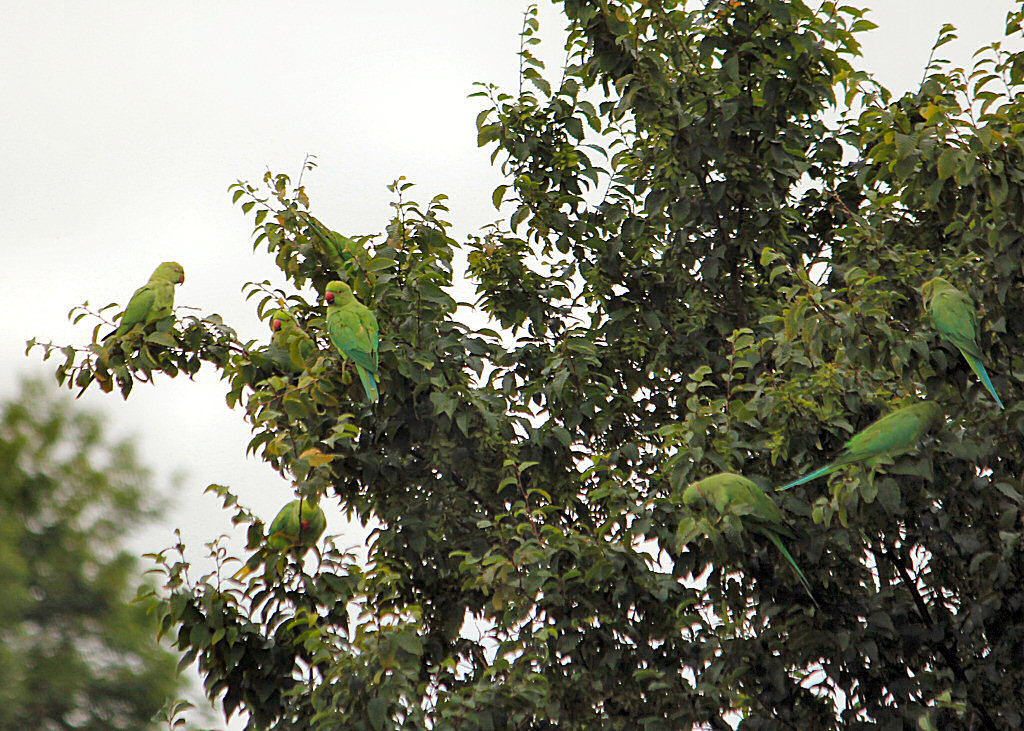
Don't Be Afraid of Entering a New Niche!
Take a look at this photo:

These birds are the famous Parrots of West London.
It's said the ancestors of these exotic tropical birds
escaped from a Victorian Zoo, or the film set of The African Queen, or even from the private menagerie of Jimi Hendrix.
However they arrived here, they soon found out there was a gigantic opportunity in the fruit eating niche,
and as a consequence their numbers have exploded! They're even forcing out the local bird population, who have been in this niche for generations.
So the lesson here is... don't be afraid to muscle in on a new niche.
Owning a Niche
So what's it take to own a niche? I've got around 50 websites and I've been in a whole load of different niches over the years. So
what makes a good niche for a small time website owner? And how do you get established within that niche?
Here are 12 factors I've noticed from my own experiences:
- Stay away from the "big" niches! I used to have websites in the finance niche, but traffic-wise they're mostly gone now. Google made a big change back around 2013 which
basically stopped small sites ranking for anything to do with loans, mortgages, credit cards, property, forex and just about anything that big business owns and makes vast amounts of money from.
To some extent this makes a lot of sense. If after all you're looking for a new credit card, would you want to view a HubPage or a blog about
credit cards? Of course not, you'd expect to see banks and finance corporations like MBNA ranking in the top 50 search results. By the way - a good way to define
a "big" niche is anything that attracts a Google AdSense click of more than $5.
- Medium sized niches are going the way of "big" niches. It's getting harder and harder to rank in things like healthcare. A lot of this is to do with
competition, but also because Google values "authority" in these niches. So if you're not a qualified doctor, stay away from health. The
same goes for other medium sized niches where established players just have too much authority.
- Too many aspiring website owners go down the blog route. If you want to get long lasting traffic then you need to offer an actual
service. So if you like patio furniture, don't just blog about it. Instead aim to start up something like a drop-shipping store that
actually allows people to buy furniture.
- Don't spend all your days and nights online. Get out and meet people. For example, the other day I got on a train, then another train
and talked to somebody who had seen one of my websites and wanted to talk about a website idea of his own. The great thing about going into
the real World is that you could actually meet people who have established businesses in your niche. They might even have a shop, an
office, factory or a warehouse which will make your niche come to life!
- Don't be afraid to strike up partnerships. Try to find like minded people, but also people who can bring something different to the table.
For example, the contact I just mentioned had a real, high street business in my niche. That was awesome, but then the guy I met
was interested in my ability to create websites and mobile apps to move his bricks and mortar business onto the Internet (he's not a programmer).
- It can be a lot harder to get websites started these days. A good way to bring in visitors is by creating top quality content.
The web is pretty saturated these days though when it comes to words and pictures. So think beyond words, and create tools, utilities and
services. Google is getting much better at identifying legit services, and they will reward you with high quality, targeted traffic. Once you start
getting some traffic, then you can build out your site, and you'll find it's much easier to rank for related keywords.
- Don't forget YouTube (and other video sharing platforms). I no longer have a TV, and I spend a lot more time watching YouTubes. I like
the fact that anybody with something to say can upload a video and be viewed from all over the World. Again, YouTube is pretty saturated these days,
but if you have something interesting to say then your content will rise to the top. Just remember to keep videos short and to the point - Google
ranks videos partly on how compelling they are (i.e. how many viewers watch the entire video without skipping bits).
- Don't be afraid to spend money on advertising. I started a membership site back in 2012 and I spent about $200 promoting it using Google
Adwords. That bought me my first 1000 members, and within a fortnight from the go-live date I had a site that looked busy! Incidentally, that investment definitely
paid off - it brought a huge spike in visitors as seen on my web stats, but 3 years later and I actually surpassed that peak by regular
web traffic from free sources.
- Don't be in too much of a hurry to monetise your site. The first thing you need is to attract visitors. Then you need to convert those
visitors into repeat visitors, and also try to lower the bounce rate. In the long term, ad-free sites tend to get way more traffic than those
plastered in advertising. And remember that you might never need to monetise your site yourself - a better way of making money could be to
build a killer website than sell it to somebody else for a six figure sum!
- Use social media to put the word out about your new site. Use Twitter and Facebook. Respond to comments and critisism and use any and all
feedback to grow your site into something even more useful.
- Don't be afraid to innovate and incorporate the latest trends into your site. For example, I'm in one niche and the
websites in that niche are all looking tired and dated. So I spent a bit of time
making my own site fully responsive and mobile friendly. It paid off as my site's traffic went up something like 40% in the months after
I updated the template. If I had more time I'd make a mobile app for my site - my competitors have done very little in the mobile space.
- Become a name in your niche. Use your real identity on your site. Put your photo on there. Use the same photo on LinkedIn, and on any
other social media platforms you use. Over time, other people in your niche will notice your identity, and be more likely to want to do business with you.
And what of the long term prospects in a new niche? Looking out into my garden I can see a grey squirrel. They're non-native to the UK,
but they have pushed out the established players and are now thriving in the finding-nuts-and-remembering-where-you-buried-them niche:

Join The Conversation
No comments left yet - be the first to leave a comment.
The first 3 visitors to post a comment on this page get a free "dofollow" link to their own website!
Leave A Comment






Post A New Comment On Home/TotalNicheDomination